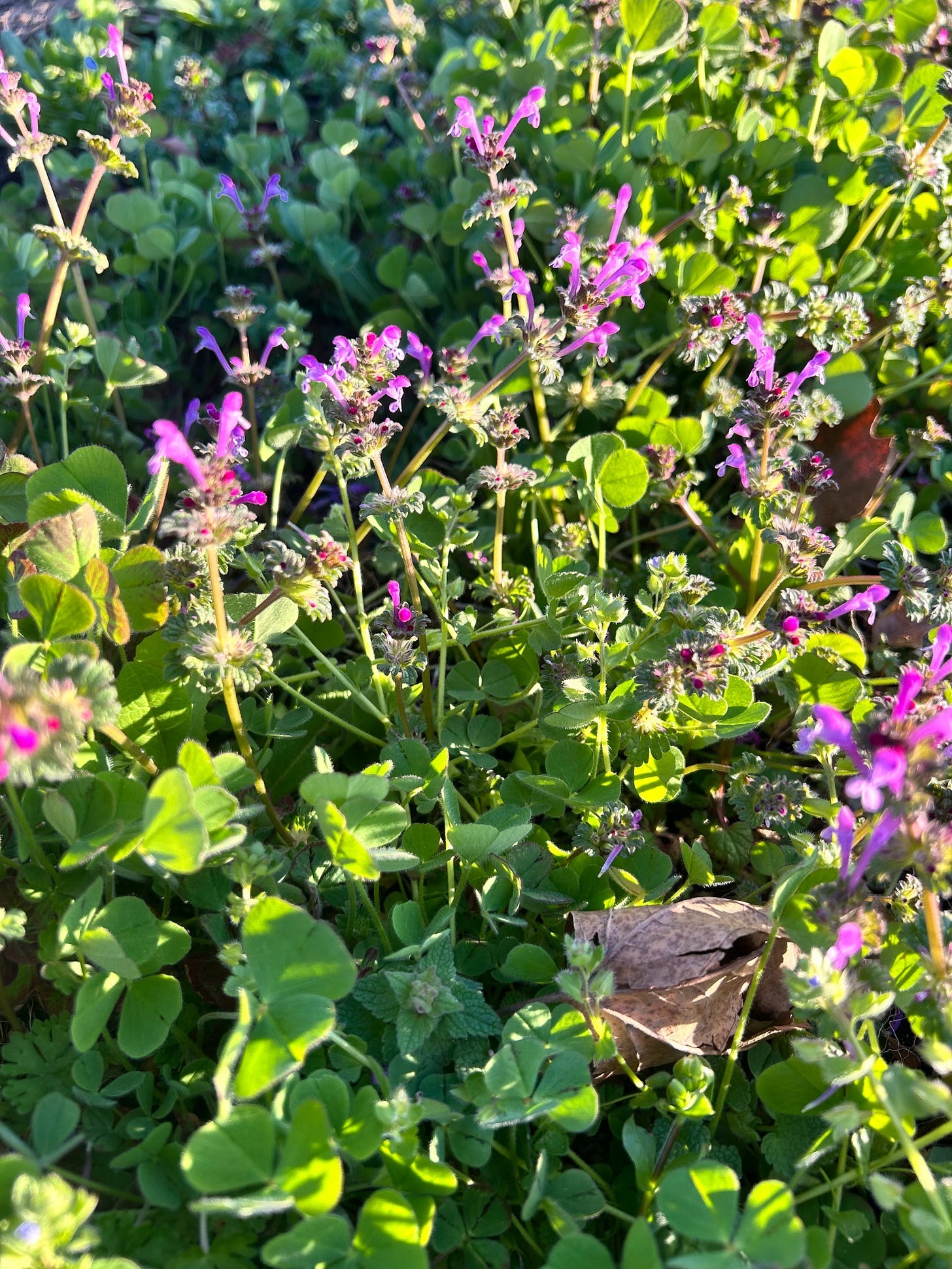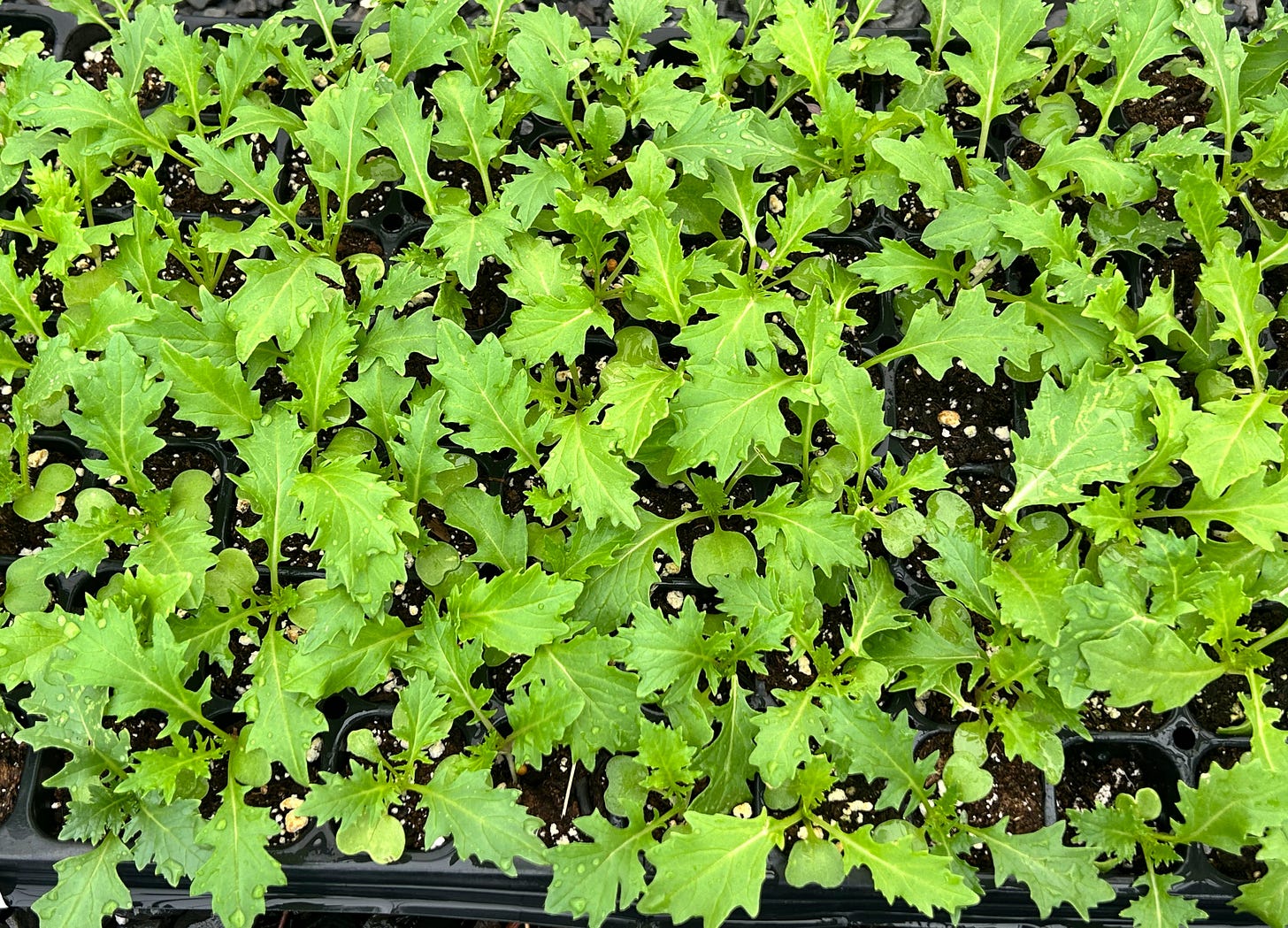Hi! Farm season is starting and I’ve been busy planting seeds in the greenhouse for Star Apple Nursery. This is a new series I’m trying out here, where I will send a weekly letter documenting my time in the plant nursery. These will be more diary-like than my usual newsletters, and will likely be written in one sitting with minimal editing. I’m hoping this can be a space where I can bring my writing and land-based practices in closer conversation with each other. I’m looking forward to sharing more of my casual thoughts and some of the ~ emotional weather ~ I’m moving through each week.
When I first moved to Philly and started working for a gardening company, henbit was one of the first “weeds” (non-cultivated plants deemed unacceptable by wealthy suburban property owners) that I became acutely aware of. There was one large property we worked on with a ton of henbit behind the house, and I soon became used to seeing their bright purple flowers and scalloped leaves.
The high tunnel I’ll be growing seed crops in this year is currently filled with henbit and clover that emerged along with the first hints of false spring. I’ll be tilling the soil and solarizing soon, but in the meantime I’ve been hanging out with the henbit in the evenings before I leave the farm. There’s a photo of them at the end of last week’s newsletter. I think they look best in the soft, diffuse light at dusk, when everything seems to quiet for a moment in recognition of the sun’s imminent departure.
I’ve been feeling a little sad at the prospect of uprooting them, because they’re pretty and they’ve been my early-season companions. I am also reminded that gardening and farming, at least as I know them, are practices of curation and control. Of deciding what life we want to tend and nurture, who should be encouraged to grow in a field, what plants are “important” enough to irrigate and prune and fertilize. While this kind of control is taken to earth-destroying extremes by Big Ag, intentionally cultivating food will always require some kind of prioritizing, some practice of shaping the land to one’s needs. Spending time with the henbit keeps me honest about that. In the midst of tending to my carefully grown crops, I want the humility to recognize the life forms I’m not taking care of, to see and honor the abundance that already exists on the farm site, completely disconnected from my efforts.
I started writing this on Saturday, April 5, a few days later than I had originally planned. It is now April 6. Yesterday I woke up early and took the trolley to the El to the bus to the greenhouse. On the way there, I fell down a research rabbithole about the Tarot of Marseilles, a form of tarot that’s lesser known than the traditional Rider-Waithe deck. I’m fascinated by how the Tarot of Marseilles emerged from the context of the early Renaissance period in Italy, a culture influenced by Turkish, Egyptian, and Iberian Jewish migration and scholarship, as well as circuits of maritime trade between Italy, Spain, and the Islamic world. I finished listening to a podcast episode about the Tarot of Marseilles and started another episode about the Romani influence on tarot while waiting in the rain for a missed bus. I’ve been trying to accept my identity as someone who is formerly anemic and currently on T and thus has longstanding issues with temperature regulation. I’ve been trying to dress accordingly. I was still underdressed yesterday, though, and was feeling increasingly grumpy as I waited for my bus with no hood or coat to shield me from the sky.
When I finally reached the greenhouse, I decided to walk around the corner to get a breakfast sandwich and tea from Dunkin’ Donuts. Being cold and rained on interacted well with other sadnesses I’ve been carrying, and I started crying as I walked back to the greenhouse with food in hand. I think some white people walking their dogs may have looked at me curiously. I was late for a planned phone call with my friend because of the missed bus. Once we were on the phone, it started raining even harder, which always sounds wild when you’re inside what is essentially a plastic box. We stayed on the phone for several hours while I watered, checked on the seedlings’ progress, set up domed plastic covers over some of the trays (my bid for the survival of hot-weather plants over the coming cold week), tidied up, planted watermelons and crookneck squash, and potted up the first tomatoes of the year. I only cried a little bit more.
I’ve been reading books more on public transit this past week, which has felt grounding. Yesterday on my way home I felt too distracted to get into the somewhat dense nonfiction book I had with me, so I looked out the window instead and then scrolled through Instagram reading updates about Zohran Mamdani, New York City’s favorite brown boy socialist right now. On the last leg of my journey I found a seat and read a Slate article documenting several hours on the campaign trail with Mamdani, during which he partied his way through the Bronx and Queens on the night of Eid. It’s hard not to imagine what my life and the lives of people I grew up around could have been like if we had the basic things Mamdani is campaigning for, the proposals seen as shockingly utopian by the American political establishment: fast and free buses, universal childcare, affordable housing, a rent freeze, and community-based mental health support teams in the subways.
As a kid, I first met uncultivated plants like henbit and clover and dandelion in the green spaces of New York, spaces which are increasingly precarious in a city designed for the wealthy and shaped by ongoing climate crisis. I met these plants in Prospect Park and Mount Prospect Park, on the edges of a playground in Manhattan’s Chinatown, in the Brooklyn Botanic Garden and community gardens and in the front yard of my apartment building. I almost always interacted with them in unplanned and spontaneous ways: blowing on a dandelion seedhead while waiting for adults to finish their conversation, picking flowers to make crowns and necklaces, putting unidentified bits of leaf and grass in my mouth because I was curious about the taste. These plants were different than the landscaped shrubs next to the public library or the pruned Japanese maples or even the lovingly tended window boxes and container gardens I could see while walking around Brooklyn. They were a quiet and steady presence, growing according to no one’s desires but their own. They invited me into a different botanical world shimmering beneath the surface of the louder one, waiting for me in the liminal moments when I look away from the work I’m supposed to be doing and admire the life that’s been there all along.
This week’s read: Enemy Feminisms: TERFS, Policewomen, and Girlbosses Against Liberation by Sophie Lewis
This week’s song: “Harmattan” by Uwade





